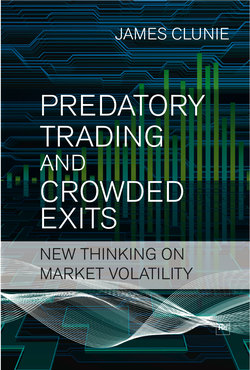Читать книгу Predatory Trading and Crowded Exits - James Clunie - Страница 10
На сайте Литреса книга снята с продажи.
Informed traders versus noise traders
ОглавлениеA noise trader is simply a trader who holds no new information about a security. Any knowledge upon which he trades is assumed to be already imputed in the security’s price. Given this definition, it might seem that noise traders would be largely irrelevant to the functioning of markets. However, Gemmill and Thomas (2002) argue that the setting of prices in a market is determined through the interactions of arbitrageurs and noise traders. Furthermore, many models for understanding how security prices are set are based on the notion that a market comprises informed traders (those who know the fair value of a security) and noise traders (those who do not know).
Who are these noise traders?
Although rarely made explicit, noise traders are implicitly assumed to include non-professional traders (e.g. retail investors) – even though it is likely that at least some retail investors have better investing track records than some professionals. Noise traders might also include traders forced to trade because of a need for liquidity. Dow and Gorton (2006) argue that “noise traders play an important role in modern finance theory”, but state that their “identities, motivations and ability to persist” are not well understood.
In other words, we do not know much about a group of people that we believe plays an important role in the workings of markets. This is quite some confession!
Noise traders can have both benign and adverse effects on markets. Black (1986) argues that with more noise trading, markets will be more liquid, in the sense of having frequent trades that allow prices to be observed. However, security prices will reflect both the information upon which information-traders trade, but also the noise upon which noise-traders trade.
As noise trading increases, information trading becomes more profitable, because of the greater noise contained in prices. However, apparent ‘information’ may already be reflected in security prices, making it difficult to differentiate information from noise. Noise can create the opportunity for profitable trading, but simultaneously makes it difficult to trade profitably.
Even without short-sale constraints, the existence of noise trading means that securities need not be rationally priced, and arbitrage becomes risky. Information can give a trader an edge, but not a guaranteed profit. Consequently, informed traders will not take large enough (i.e. risky enough) positions to eliminate the noise.
Black surmises that it will be difficult to show that information-traders perform better than noise-traders, and argues:
there will always be a lot of ambiguity about who is an information trader and who is a noise trader.
Noise traders, through their uninformed trades, can set up mis-pricing opportunities for better-informed traders to exploit. But noise traders can also overwhelm informed traders, if their scale is large and they trade in a similar fashion to one another.
Noise traders should thus be applauded for creating opportunities for traders, but also feared when they move as a pack. Superior knowledge alone is not enough to guarantee success as a trader. We know from financial history that even well-informed arbitrageurs can be quite vulnerable.
